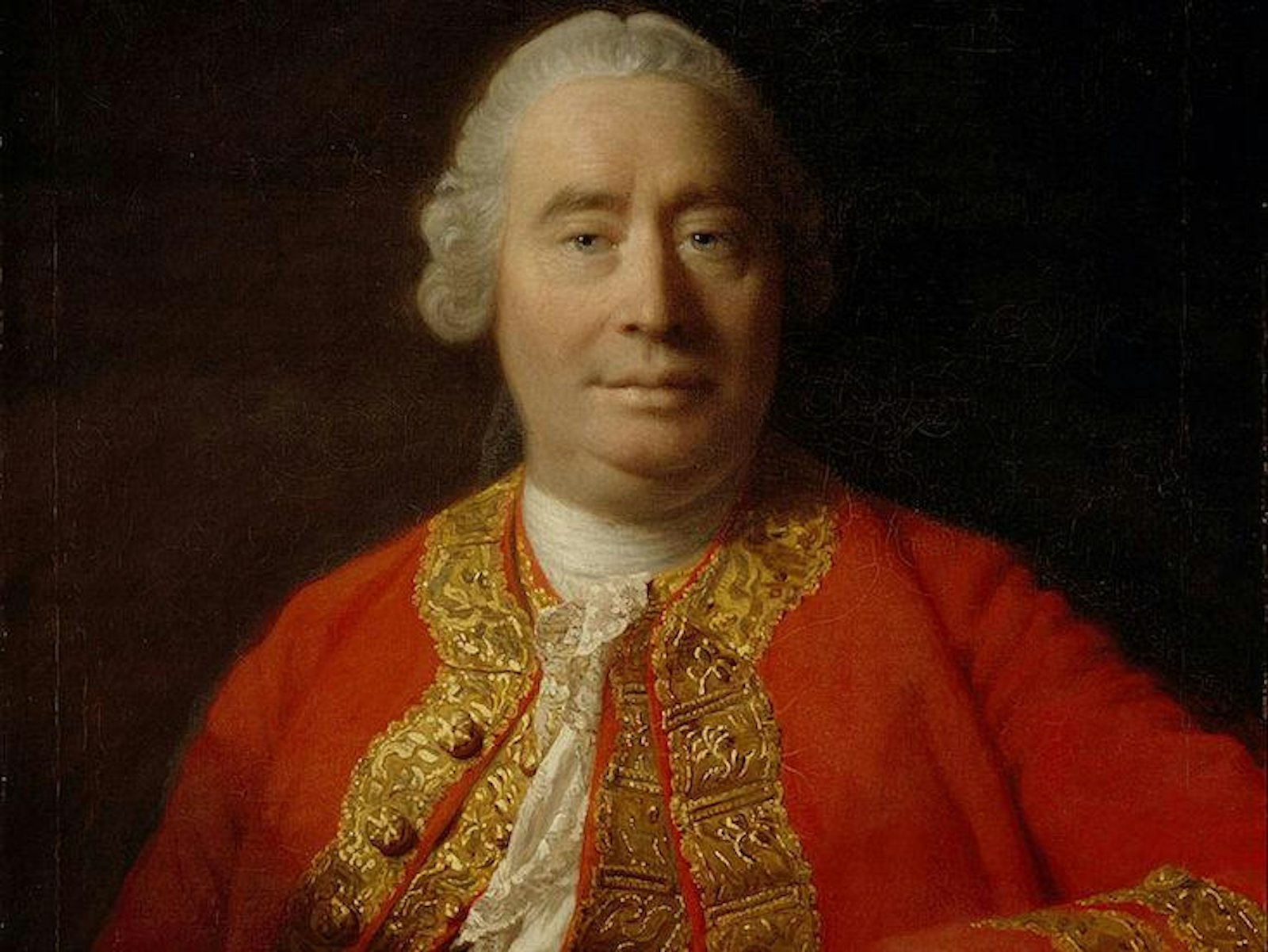David Chalmers, co-director of the Center for Mind, Brain and Consciousness at New York University, once undertook something odd for a philosopher: He conducted an international poll. In November 2009, he and his then-PhD advisee, David Bourget, asked over 2,500 of their colleagues—professors and graduate students alike—among other things, with which dead thinker they most identified.
The results, published in 2013, showed that philosophers’ favorite was, overwhelmingly, David Hume, the 18th-century Scottish philosopher infamous, and now famous, for being skeptical not just about the claims of religion, but also the existence of the self, a subject that’s still scientifically unsettled.
So it was with auspicious timing that James Harris—currently Head of Department and Reader in the History of Philosophy at the University of Saint Andrews, in Scotland—wrote Hume: An Intellectual Biography, published by Cambridge University Press in October of last year. It’s unprecedented. Harris calls it “the first comprehensive account of all of what Hume did,” adding, “Nobody had really written a book about all of it.” In the 600-plus-page book, he touches on the major events of Hume’s personal life (notably that he began his greatest work, A Treatise of Human Nature, when he was 23 years old) but they’re not the focus; he’s more attuned to Hume as a philosopher—of human nature, politics, economics, religion, and history.
As a result, Harris dispels the various misconceptions surrounding Hume’s religious beliefs, his politics, and his moral philosophy. In our conversation about these topics, Harris illuminated why Hume’s ideas are so attractive—if not crucial—even today.
What is it about Hume that excites you the most?
What it is that appeals to me in Hume is his resolute refusal to buy into extremist, enthusiastic modes of religious, moral, political discourse. Hume was living in a very politically charged time. A useful comparison might be with how divided American political culture is right now. There really was a kind of pervasive factionalism that really was very dangerous to the culture, so he was trying to transcend divisions between the Whigs and Tories and present a new way of thinking about politics.
He says that, once we understand the origins of our sentiments—moral, political, religious—they will moderate themselves and will be less likely to cause conflict in the societies in which we live. I think that’s a really salient and ongoing and permanently relevant message: It doesn’t matter what kind of society you live in. That’s something that appeals to me a great deal—and that understanding of the world is a way of making the world a more peaceful place.

Why do modern philosophers so tightly identify with Hume?
Well, I think for a variety of reasons. Close to top of the list would probably be the fact that he was a religious skeptic. Interestingly, people didn’t like that about Hume until relatively recently. I suppose, also, a kind of general skepticism about the reach of human knowledge, and the certainty of what human beings can achieve. These resonate with people; plus, of course, an extraordinary writing style and sense of humor and obviously just an extraordinary intelligence. All of these things together; it’s a rare combination.
Is it true that he veiled a lot of his beliefs in more socially palatable ways?
I know a lot of people have that view of Hume. I don’t really see things quite that way.
How do you see it?
He was a skeptic in the true sense of the word. One of the really extraordinary things about him in his own time, which a lot of people and his friends found it very hard to understand, was that the kind of deep questions of religion just didn’t matter to him. Partly, that was because a lot of the theories that secular people have at their disposal these days—theories like the origin of the universe and evolution—obviously weren’t available to Hume. There were other people who—James Boswell was a very obvious example—were attracted by Hume but couldn’t help themselves be terrified by death and the prospect of what happened after death. Hume wasn’t like that. I think his view was that he just didn’t know what the answers were to those questions. So they just didn’t matter.
But even being a skeptic was a somewhat risky or at least controversial business at the time. Certainly, he does feel the need to use indirect modes of literary expression when he deals with religion dialogue—being the most obvious of these kinds—making it harder for the reader to identify any particular point of view as Hume’s own. But it’s easy to exaggerate the extent to which his opinions were dangerous in Britain at this time. In certain circles, people were just losing the intensity of their interest and commitment to religion. I mean tolerance-wise, but another word might be simply be “indifference.” Hume knew that and took advantage of it. But he wasn’t a dogmatic atheist. Many of his friends were church ministers, for example. He disagreed with them about all sorts of things, but they were real friendships and I think intellectual friendships. So he was a kind of modern figure in that regard, I think.
Did Hume want to be a philosopher when he was growing up?
From an early age, he decided that he wanted to be somebody who would make a living from writing. This was becoming possible in the 18th century, but the possibility was only just coming into view when Hume was a young man. So he didn’t really have any obvious role models. I think it would’ve been a surprise and a frustration for his family that he wanted to live that way; but he stuck with it and, I think—not everybody thinks this—that, without compromising on intellectual ambition and achievement, he did live that life to the full, with extraordinary success, and made himself very rich. We shouldn’t be fooled by his rather self-deprecating and ironic way of describing himself as misunderstood, as not properly appreciated.

Does modern moral psychology vindicate Hume’s ideas about ethics and the mind?
People do say this. In the 20th century, Hume became a kind of a prophet of a different kind of philosophy—of naturalistic philosophy—which accepts a kind of fuzzy interface between philosophy and psychology and cognitive science. There are plenty of people writing books trying to make sense of Hume using the concepts and experiments of modern cognitive science. Hume’s naturalistic disposition makes him congenial to that; on the other hand there are people who think that, in his kind of anti-innatism and extreme empiricism, Hume misunderstands some of the very basic features of human cognition and the way we construct worlds for ourselves.
I think one thing that’s really characteristic of Hume as a moral philosopher is a kind of general skepticism about the capacity of philosophy to do very much in everyday life. He is very skeptical, for instance, of the Ancient Greco-Roman idea of philosophy as a way of making yourself better and happier. It’s not that kind of activity to him. Happiness and good character and so forth are much more a matter of luck than anything else. On the other hand, he did think that he had something to offer as a kind of therapist, as it were, of political culture. Politics still have this tendency towards fragmentation into factions and all the problems that engenders in a political culture, and I think we’ve got something to learn from Hume there.
Which of Hume’s ideas have you found to be most misunderstood?
I think I’d have to say the religious stuff is the easiest to misunderstand in precisely the ways I’ve described. It’s also easy to misunderstand his moral philosophy and take him to be a kind of subjectivist antirealist, to use the language of modern philosophy. It’s also easy to mischaracterize his politics and that certainly happened in his own time and in the 19th century, when he was read as being as what we’d now call a conservative Tory. I think that’s wrong.
Cody Delistraty is a writer and historian based in Paris. He writes on books, culture, and interesting humans for places like The New York Times, The New Yorker, The Paris Review, and Aeon. Follow him on Twitter @Delistraty.






























